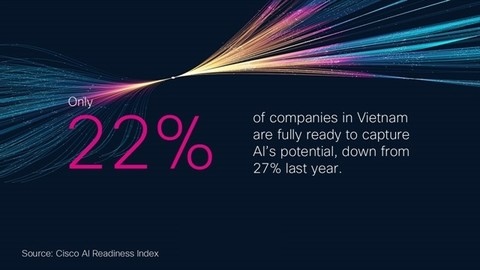AI readiness declines in Việt Nam despite rapid market evolution
AI readiness declines in Việt Nam despite rapid market evolution
Only 22 per cent of organisations in Việt Nam are fully prepared to deploy and leverage AI-powered technologies, down from 27 per cent a year ago. This decline underscores the challenges companies face in adopting, deploying, and fully leveraging AI. Given the rapid market evolution and the significant impact AI is anticipated to have on business operations, this readiness gap is especially critical.

The AI Readiness Index in 2024 of Cisco reveals that only 22 per cent of organisations in Việt Nam are fully prepared to deploy and leverage AI-powered technologies. — Photo courtesy of Cisco |
This information was released by Cisco, a worldwide leader in networking and security, in its 2024 AI Readiness Index on Thursday.
The Index is based on a double-blind survey of 3,660 senior business leaders from organisations with 500 or more employees across 14 markets in the Asia-Pacific, Japan and China. These leaders are responsible for AI integration and deployment within their organisations. The AI readiness index is measured across six pillars: strategy, infrastructure, data, governance, talent and culture.
AI has become a cornerstone for business strategy, with increasing urgency among companies to adopt and deploy AI technologies. In Việt Nam, enterprises report an increased urgency to deploy AI in the past year, driven primarily by leadership. Additionally, companies are committing a significant number of resources towards AI, with 48 per cent reporting that as much as 10 to 30 per cent of their IT budget is being allocated to AI deployment.
Despite significant AI investments in strategic areas like cybersecurity, IT infrastructure, and data analytics and management, many companies report that returns on these investments are not meeting their expectations.
“As companies accelerate their AI journeys, it's critical they adopt a comprehensive approach to implementation and connect the dots to link AI ambition with readiness," said Dzung Nguyen Nhu, Managing Director at Cisco Việt Nam, Cambodia, and Laos. “This year's AI Readiness Index reveals that to fully leverage the potential of AI, companies need a modern digital infrastructure capable of meeting evolving power needs and network latency requirements from growing AI workloads. This must be supported with the right visibility to achieve their business objectives.”
Companies recognise they need to do more to be better prepared to leverage AI effectively. Across Việt Nam, 63 per cent rated improving scalability, flexibility, and manageability of their IT infrastructure as their top priority, highlighting an awareness of the gaps that must be addressed to improve overall AI readiness.
Addressing skills and talent gaps
Despite unique challenges within each pillar, there is a common theme that has emerged across the board – that of lack of skilled workers. Companies highlighted this as the top challenge across infrastructure, data, and governance, underscoring the critical need for skilled professionals to drive AI initiatives.
Anupam Trehan, VP of People and Communities APJC at Cisco, said: “As the race to adopt AI picks up pace, talent will be a key differentiator for companies. There is already a shortage of skilled talent across various aspects of AI. This means companies will need to invest in their existing talent pool to meet growing demand. At the same time, it is crucial that all stakeholders – the private and public sectors, educational institutions, and governments – work together to develop local talent so that the entire ecosystem can benefit from the immense potential that AI offers.”



























